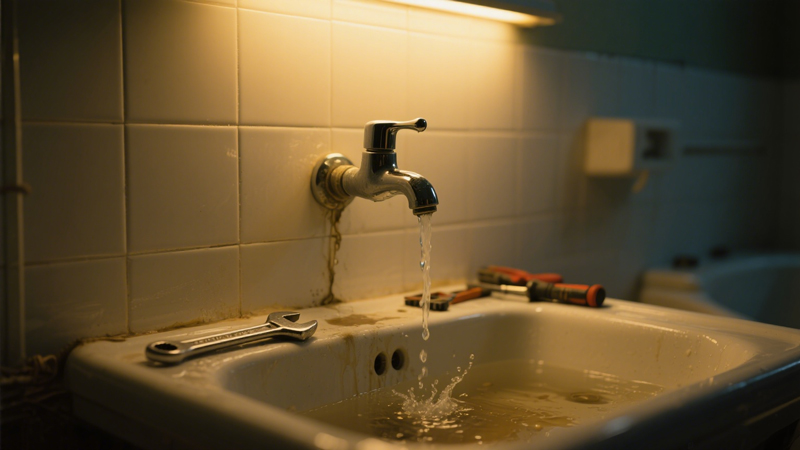 A leaky faucet is one of those household nuisances that can go from minor irritation to major concern, especially when it seems to happen only at night. You might notice that your faucet is silent during the day, but come nighttime, you hear the persistent “drip… drip… drip…” echoing through your quiet home. Not only is this sound annoying, but it also wastes water and can point to underlying plumbing issues.
A leaky faucet is one of those household nuisances that can go from minor irritation to major concern, especially when it seems to happen only at night. You might notice that your faucet is silent during the day, but come nighttime, you hear the persistent “drip… drip… drip…” echoing through your quiet home. Not only is this sound annoying, but it also wastes water and can point to underlying plumbing issues.
So why does your faucet only leak at night? And what can you do about it? This post explores the possible reasons and offers step-by-step guidance on how to deal with this specific issue.
Why Does the Faucet Leak Only at Night?
It might seem strange, but there are a few logical reasons why a faucet would start leaking only when the sun goes down:
1. Water Pressure Fluctuations
Water usage is typically higher during the day when people are showering, washing clothes, and running appliances. At night, usage drops significantly, which can lead to a rise in water pressure. If your faucet has a weak seal or a worn-out washer, this increased pressure can cause it to drip only when the rest of the system is relatively quiet.
2. Temperature Changes
Metal expands and contracts with temperature. If the faucet or the pipes are exposed to cooler night temperatures, the contraction can slightly change how the components fit together, possibly creating small gaps for water to escape.
3. Auditory Illusion
Your faucet might actually leak 24/7, but during the daytime, ambient noises drown out the sound. At night, the house is quiet, and you suddenly notice the dripping that’s been happening all along.
4. Vacuum Effect or Air in Pipes
Plumbing systems are complex. Sometimes, a vacuum effect or air buildup in the pipes can force water out slowly through the weakest point — often a compromised faucet — and this might occur more noticeably during off-peak hours.
Step-by-Step Guide to Diagnosing and Fixing a Nighttime Leak
Step 1: Confirm the Leak Is Only at Night
Try this simple test: Place a dry bowl or paper towel under the faucet before bed and check it in the morning. If it’s wet or has water in it, the leak is real and not just a nighttime perception. Check again in the afternoon. If it’s dry then, you’ve confirmed it’s mainly a nighttime issue.
Step 2: Turn Off the Water Supply
Before inspecting the faucet, always turn off the water supply under the sink. This prevents water from spilling everywhere when you disassemble parts.
Step 3: Inspect the Faucet
Take a closer look at your faucet’s components. Remove the handle and the valve stem. Check for:
-
Worn-out washers
-
Damaged O-rings
-
Corroded valve seats
These are common culprits for intermittent leaks. Even a tiny crack or flattened washer can allow drips under certain conditions.
Step 4: Replace Necessary Parts
Once you’ve identified worn or damaged parts, take them to a hardware store for replacements. If you’re not sure what you need, bring a photo or the old part and ask for help. Most modern faucet brands sell repair kits.
Step 5: Reassemble and Test
Put the faucet back together and turn the water supply back on. Test it by running water, then shutting it off and listening for leaks. Also, place another paper towel under the faucet overnight and check again in the morning.
Extra Tips to Prevent Nighttime Faucet Leaks
1. Install a Pressure Regulator
If high nighttime pressure is the issue, consider installing a pressure-reducing valve (PRV) on your main water line. This keeps water pressure within safe limits and can protect all your plumbing fixtures from wear and tear.
2. Use Teflon Tape on Threads
If your faucet assembly has threaded connections, wrapping Teflon tape around them before reassembling can create a better seal and prevent leaks.
3. Schedule Annual Plumbing Inspections
A professional plumber can detect pressure anomalies, slow leaks, and failing components before they become serious issues. Preventive maintenance pays off in the long run.
4. Try a Drip Catcher
As a short-term solution, use a faucet drip catcher or absorbent pad. It won’t stop the leak but can reduce the noise and avoid water pooling overnight while you prepare a permanent fix.
When to Call a Professional
If you’ve replaced washers and O-rings, checked the valve seats, and your faucet still leaks only at night, it might be time to call in a plumber. There could be hidden issues in the supply line, water pressure regulation system, or even a problem with how the plumbing is vented or installed. A pro has the tools and experience to diagnose and resolve what might be a deeper issue.
Conclusion
A nighttime-only faucet leak may seem like a small problem, but it’s often a symptom of an underlying issue like high water pressure, temperature changes, or aging faucet components. The good news is, with a little detective work and some basic DIY skills, most faucet leaks can be diagnosed and fixed without too much hassle. If you’re not comfortable with plumbing repairs, don’t hesitate to call a professional — it’s better to resolve the issue early than to let it worsen and increase your water bill or cause water damage.
By understanding what’s happening and following a systematic approach, you can enjoy quieter nights and a healthier plumbing system.
 iVIGA Faucet Online Shop
iVIGA Faucet Online Shop
